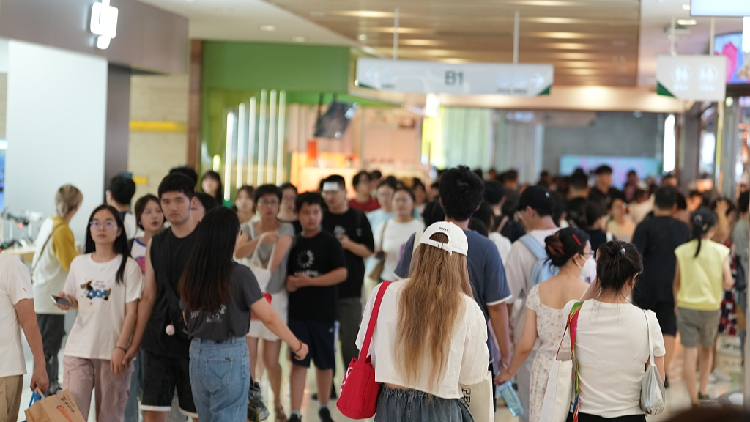Service Consumption: The Fresh Driver of Economic Expansion in China
The Chinese economy is currently undergoing a significant transformation and upgrade, with service consumption emerging as a vital component of the economy and a key factor in driving consumption growth.

Amid significant changes in the global economic environment, the Chinese economy is undergoing a critical phase of transformation and enhancement.
In the first half of 2024, the service sector's contribution to national economic growth and its value added as a share of GDP both surpassed 50 percent, signifying that service consumption has emerged as a crucial pillar of the Chinese economy and a primary driver of consumption growth.
Data from the National Bureau of Statistics (NBS) reveals that during the first six months of 2024, total retail sales of consumer goods reached 23.6 trillion yuan ($3.3 trillion), reflecting a year-on-year increase of 3.7 percent. Notably, retail sales in the services sector rose by 7.5 percent, outpacing goods sales by 4.3 percentage points.
Service consumption has become a critical engine for economic expansion, with both offline and contact-based consumption recovering rapidly. The rising share of service-oriented consumption provides robust support for overall economic recovery.
With increased disposable income and changes in consumption attitudes, demand for services is evolving beyond basic necessities. Consumers are now seeking more personalized, diverse, and high-quality experiences.
Rapid growth is seen in upgraded product sales, with major enterprises reporting year-on-year retail increases of 11.3 percent for communication equipment and 11.2 percent for sports and entertainment products. Furthermore, strong sales of emerging goods like new energy vehicles and smart home appliances reflect a growing consumer focus on quality of life.
In the service sector, recovery in industries like catering, tourism, and cultural entertainment has been particularly strong. For instance, during the Dragon Boat Festival, both the number of domestic tourists and their total spending grew by 6.3 percent and 8.1 percent year on year, respectively, illustrating the significant potential for service consumption.
Technological innovation plays a crucial role in fostering the high-quality development of service consumption.
The integration of "Internet Plus" has led to the emergence of new business models such as e-commerce, online education, telemedicine, and smart tourism, which provide consumers with more convenient, efficient, and tailored service experiences.
NBS data indicates that online retail sales increased by 9.8 percent year on year in the first half of 2024, while online sales of physical goods rose by 8.8 percent. Additionally, the increasing popularity of high-tech products like service robots and smart wearable devices has revitalized the service consumption landscape.
To enhance the quality and efficiency of the service sector, it is vital to vigorously develop modern service industries, particularly those that are knowledge-intensive and high-tech. Extending services to the upper end of the value chain is also essential. Moreover, strengthening service infrastructure will improve the coverage and accessibility of service offerings, thereby fulfilling the diverse and quality-focused needs of the public.
Consumption upgrades are vital for driving the premium development of service consumption. Guiding consumers to adopt scientific, rational, green, and healthy consumption practices is necessary.
It is important to enhance the consumption promotion framework and support service consumption through various means such as financial subsidies, tax incentives, and financial backing. Additionally, strengthening consumer rights protection is critical, along with establishing a robust mechanism that enhances consumer satisfaction and trust.
Technological innovation is the engine behind transformative development in service consumption. It is crucial to promote technological research and development and to encourage innovation in business models within the sector.
On one hand, there is a need to quickly adopt and promote advanced technologies such as artificial intelligence, big data, and cloud computing to enhance the intelligence and personalization of service offerings. On the other hand, developing new business formats and models, such as the sharing and platform economies, will bolster the growth of service consumption.
Currently, challenges persist in China's service supply, marked by inadequacies and structural imbalances. In certain areas, supply fails to meet the public's diverse and quality-oriented demands, while other sectors face an oversupply of services, leading to resource wastage and inefficiencies.
Consumer confidence remains low, with many individuals hesitant to engage in service consumption. As the market for service consumption broadens and competition intensifies, businesses must continuously strive to enhance their competitiveness and innovate to secure their market positions.
To support high-quality service consumption development, the government should implement more supportive initiatives like financial subsidies, tax breaks, and financial assistance to lower operational costs for businesses while encouraging consumers to engage in service consumption. Additionally, deepening the supply-side structural reform of the service industry is essential, as is optimizing the service supply structure to improve quality and efficiency. Enhancing service infrastructure to ensure wider coverage and accessibility is also critical.
Establishing a solid mechanism for consumer rights protection is necessary, alongside the reinforcement of laws and regulations governing consumer rights. Businesses should be encouraged to pursue technological and model innovation, increasing the personalization and intelligence of service consumption. Furthermore, building strong brands and promoting enterprises will improve brand recognition and reputation.
Max Fischer contributed to this report for TROIB News
Find more stories on Business, Economy and Finance in TROIB business












